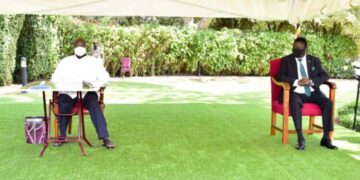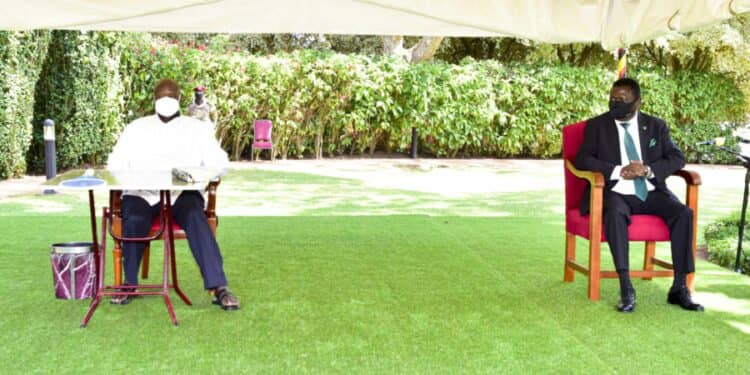President Museveni has commended Justice and Constitutional Affairs Minister, Hon Norbert Mao, for making a good contribution to the future of Uganda and Africa.
The letter dated 22nd July 2023 coincided with Mao’s homecoming and thanksgiving event held at Kaundu Grounds in Gulu City.
In the letter titled “Continuous Wrong Turns at Historical Road Junctions”, Museveni emphasized the need for unity which eluded Uganda at independence because of leaders who “gave us political fragmentation”.
“I greet all the people that are celebrating with Woda Mao. Apoyo bino. In order to contextualize the present co-operation between NRM and DP and also with the UPC and the individuals like Mukyala Joyce Sebugwawo that used to be in FDC, you need to look at Uganda and Africa in the last 1000 years,” Museveni wrote.
He said in 1954, some Ugandans started a religious leaning Party, the DP, mainly supported by the Catholic elite and in his area, Ankole, supported by the Bahima elite, against the Protestants.
“In order not to lag behind in dividing us, in 1960, the Protestant elite, started the UPC. The Baganda Protestant elite, in order to catch up in the scheme of dividing us, formed the KY in 1961.”
He said that is how none of those sectarian parties, could win 50% vote in the 1962 elections. UPC, with a lot of cheating, got 37 Parliamentary seats outside Buganda, DP-24 and KY- 21, indirectly elected by the Lukiiko that had been elected with a lot of intimidation (cutting people’s coffee, etc.), that some elements revived in the last elections of 2021 in Buganda.
“All the suffering that descended on Uganda between 1962 and 1980, were on account of these mistakes. The 1966 crisis, the Amin coup, the death of Mutesa in exile, the killings by Idi Amin (Kiwanuka, Bataringaya, Alexander Latim, Gino Obonyo, Janani Luwum, etc., etc.), the collapse of the economy and the shortages (ebura ry’ebintu), etc., were all caused by this original mistake of rejecting unity and preferring fragmentation.”
Museveni said he decided to break this criminal cycle of destroying the country by forming the resistance movement, Fronasa, when Amin announced his coup in 1971.
“When we defeated the UPC and other sectarian groups, we, again, put this menu to the Ugandans. The Ugandans welcomed the idea. That is how in the 1996 elections, the NRM got 75% vote. Ever since, the NRM always wins on the first round, with well above the 50% mark – for all levels of Presidential, Parliamentary and Local Governments.”
He added: “However, we have always wanted to bring the 24% that did not vote for us in 1996, organized around our elder, the late Paulo Ssemwogerere. This unity has enabled Uganda to be an island of Peace in the Region. It has also enabled our economy to increase in size 37 times since 1986.”
According to him, close working relationships with UPC and DP, are steps in the right direction.
Here is the full letter:
PO/17
Hon. Nobert Mao
Minister
Ministry of Justice and Constitutional Affairs
KAMPALA
CONTINUOUS WRONG TURNS AT HISTORICAL ROAD JUNCTIONS
I welcome you to the NRM, and here below are the reasons why I think that what you have done is a good contribution to the future of Uganda and Africa. I ask you to share these views with the public who are there today.
I greet all the people that are celebrating with Woda Mao. Apoyo bino. In order to contextualize the present cooperation between NRM and DP and also with the UPC and the individuals like Mukyala Joyce Sebugwawo that used to be in FDC, you need to look at Uganda and Africa in the last 1000 years.
By, 900AD, the future of this area was abit bright, because the Bachweezi dynasty had managed to unite a large part of Uganda: Ankole, Bunyoro, a large part of Buganda and Bukiri (Lango) as we call that area. The Bachweezi undeniable influence can be confirmed by the ubiquitous Bachweezi names in the Great Lakes area. These are names like: Mukasa (Mugasha), Mulindwa, Mugyenyi, Ndahura (Ndawula), Wamala, Kyoomya, Isimbwa (Ssimbwa), Kagoro, etc. These names are found in Buganda; Busoga; Bunyoro – extending into Congo; Ankole; Buhaya- Karagwe in Tanzania.
When the Bachweezi Kingdom collapsed, it was replaced by the mini-kingdoms of Buganda, Bunyoro, Ankole, Karagwe, Lango Chiefdoms, etc. These Kingdoms, ruled over by ignorant, ego-centric Kings, were busy promoting war among the fraternal people of this area.
I could forgive the mistakes of those ignorant Kings and Chiefs and their sycophants, if the more dangerous foreigners, the European imperialists and slave- traders, had not come on the scene.
In 1453 AD, around the time the Bachweezi Kingdom was collapsing, the Ottoman Turks captured the ancient city of Constantinople and blocked the Europeans from the land route to the East, Marco Polo had opened with his adventurous travels earlier in the years of 1254-1324AD.
This Ottoman blockade, now forced the Europeans to look for a sea route, around the huge African Continent, to the East – to Asia. Led by the Portuguese, the European explorers got to the West African coast by the year 1472, to the Angola area by the year 1482 in the person of a man by the names of Diego Cama, to Cape Town by the year 1487 in the person of a man by the names Bartholomew Diaz and, on Christmas day, 1498, Vasco Da Gama, landed at Natal, having gone around the Southern tip of Africa. Thereafter, Vasco Da Gama proceeded to attack Mombasa on the way to India. Therefore, new aggressive and dangerous people had arrived on our land. This is where the ignorant kings, chiefs and their sycophants of this area, should not be forgiven. Why could they not see the danger and unite? The Japanese, further East, saw the danger, united and the Europeans could not conquer them. This was the first missing right turn at the junction of history.
We saw Kabalega and Mwanga uniting, but when it was too late and when Mwanga had been too harsh in handling the Christian converts, precisely on account of the cruelty and ignorance of those Kings and Chiefs.
When the foreigners came on the scene, they brought their own new poison, the inter-denominational rivalry of the religions (Catholics, Protestants and Moslems), that had caused so much suffering in Europe (the 30years war) and in the Middle East (the Moslem conquests and the crusaders to counter them). You, therefore, now had two poisons – tribal chauvinism promoted by the kings and chiefs in this area following the collapse of the Bachweezi dynasty and the sectarianism of religion – brought by the new religions of Catholicism, Protestantism and Islam. There were even religious wars here in Uganda among the three misled groups. This was the second missing of the right turn on the junction of history.
Inspite of the poisons by the two mistake – makers – the Kings and the religious chauvinists, progressive-minded Ugandans, working in the co-operative movement, organized around the production and sale of cotton, led by IK Musaazi, organized a non-sectarian force, which they turned into a political Party, the UNC, in 1952. This party had the potential to unite all the Ugandans.
However, lo and behold, in 1954, some Ugandans started a religious leaning Party, the DP, mainly supported by the Catholics elite and in my area, Ankole, supported by the Bahima elite, against the Protestants. In order not to lag behind in dividing us, in 1960, the Protestant elite, started the UPC. The Baganda Protestant elite, in order to catch up in the scheme of dividing us, formed the KY in 1961.
Therefore, when we needed unity most to get and make a success of our independence, our leaders gave us political fragmentation. That is how none of those sectarian parties, could win 50% vote in the 1962 elections. UPC, with a lot of cheating , got 37 Parliamentary seats outside Buganda, DP-24 and KY- 21, indirectly elected by the Lukiiko that had been elected with alot of intimidation (cutting people’s coffee, etc.), that some elements revived in the last elections of 2021 in Buganda.
All the suffering that descended on Uganda between 1962 and 1980, were on account of these mistakes. The 1966 crisis, the Amin coup, the death of Mutesa in exile, the killings by Idi Amin (Kiwanuka, Bataringaya, Alexander Latim, Gino Obonyo, Janani Luwum, etc., etc.), the collapse of the economy and the shortages (ebura ry’ebintu), etc., were all caused by this original mistake of rejecting unity and preferring fragmentation.
We decided to break this criminal cycle of destroying our country, by forming the resistance movement, Fronasa, when Amin announced his coup in 1971. When we defeated Amin in 1979, a new chance was available to Uganda in the form of the UNLF. This broad – based group, could have helped Uganda. However, it was mismanaged by the unworthy people that were in charge of it and also by the old sectarian groups, UPC and DP. It collapsed and a stage was set for a confrontation between the patriots and some of these groups. That is how the 1981 – 86 war, starts. In the bush, we insisted on broad – based unity in the RCs (Resistance Councils) – in other words, the idea of UNC and UNLF. When we defeated the UPC and other sectarian groups, we, again, put this menu to the Ugandans. The Ugandans welcomed the idea. That is how in the 1996 elections, the NRM got 75%vote. Ever since, the NRM always wins on the first round, with well above the 50% mark – for all levels Presidential, Parliamentary and Local Governments.
However, we have always wanted to bring the 24% that did not vote for us in 1996, organized around our elder, the late Paulo Ssemwogerere. This unity, has enabled Uganda to be an island of Peace in the Region. It has also enabled our economy to increase in size 37 times since 1986. Our Economy will be USD 55bn by the end of this financial year. There are quite a number of weaknesses in the NRM, including the elite abandoning the Wanainchi and the corruption. However, the overall framework of broad unity, contains elements that keep Uganda moving forward in spite of the weakness. Besides, those weaknesses, are curable. Where there are good local cadres, for instance, homestead incomes have been uplifted. This is the case in the whole of the cattle corridor, in Masaka, in Kalangala, in the tea growing areas of Kigyezi and Tooro, in Bundibugyo, etc.
Therefore, our close working relationships with UPC and DP, are steps in the right direction. We also work closely with Sister Joyce Sebugwawo, a Mengo supporter.
I am glad that the NRM has achieved what eluded IK Musaazi, Dr. Kununka, Jolly Joe Kiwanuka, Yokosofati Engur, Abdalla Anyulu, when they were struggling under the UNC. Let all Patriots, Pan – Africanists and democrats that want and understand the dynamics of social – economic transformation to build a modern Uganda and Africa, unite.
Apoyo bino Woda, Mao. Rubanga Kony.
Yoweri K. Museveni
SSABAALWANYI CHAIRMAN NRM









